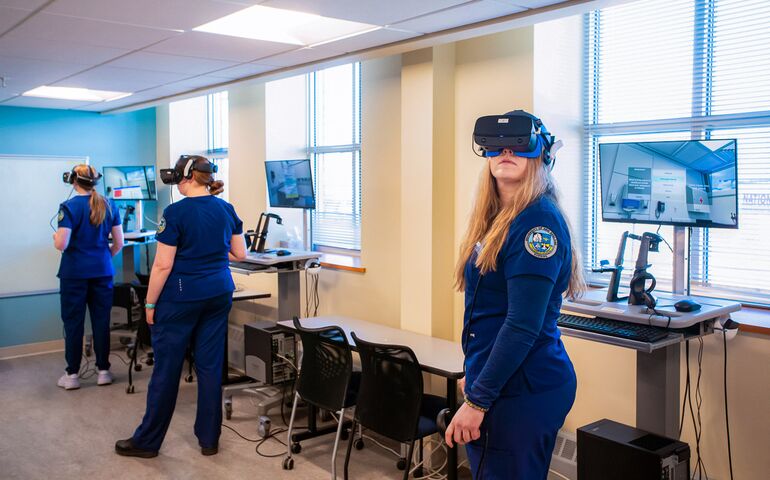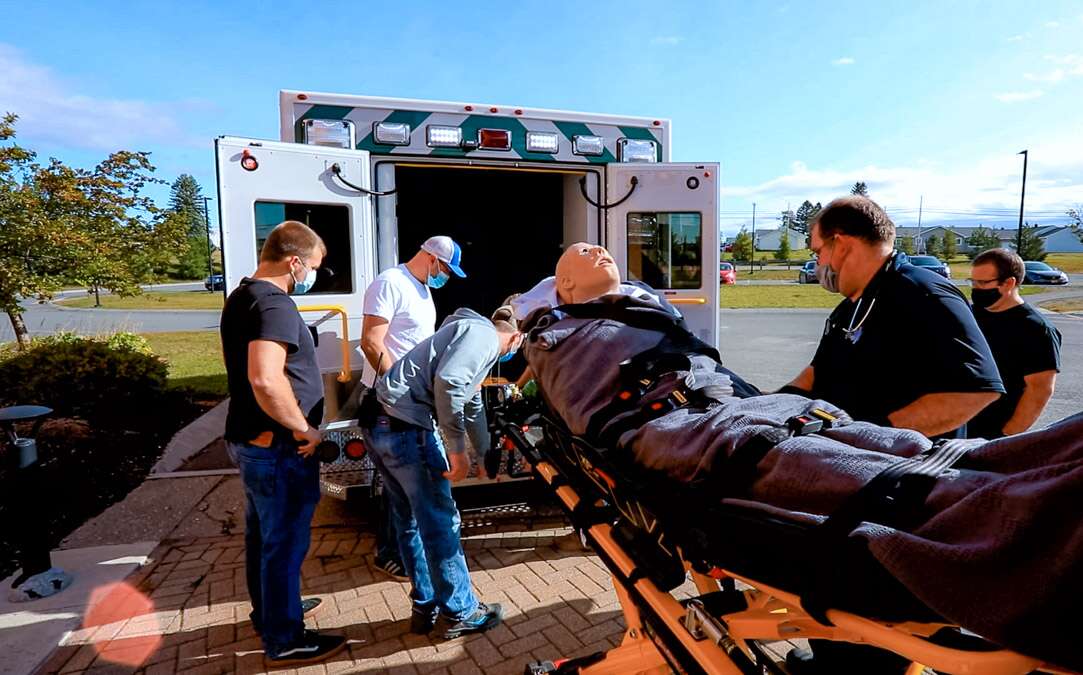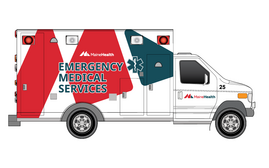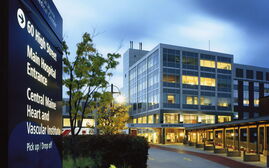
Processing Your Payment
Please do not leave this page until complete. This can take a few moments.
Maine’s health care industry steps up effort to recruit and retain workers
 Photo / Tim Greenway
Nursing student Miley Warlick, right, works with a virtual reality simulator in the Interprofessional Simulation and Innovation Center at UNE's Portland campus.
Photo / Tim Greenway
Nursing student Miley Warlick, right, works with a virtual reality simulator in the Interprofessional Simulation and Innovation Center at UNE's Portland campus.
Maine health care providers and their higher-education partners have been working nonstop to reduce the state’s shortage of nurses and other health care professionals. And while the bright red bleeding appears to have stopped, many more younger workers are still needed.
MaineHealth, the state’s largest health care system, had about 700 openings for registered nurses systemwide as of March, says Clayton Holtzman, its vice president of communications and public affairs.
Most of those positions were being filled by travel nurses, which Holtzman says is not financially sustainable. Travel RNs in Maine earned an average of $3,374 per week as of May 2021, about 238% of the $1,416 per week earned by regular RNs, according to health care industry publication Becker’s Hospital Review.
“Here in Maine, the good news side of things is that we’ve increased the degree-production for RNs,” Holtzman says. “However, we’ve lost a lot of nurses, either because of retirements, early retirements, or people leaving for the traveling industry, which has taken away a lot of nurses.”
Health care providers say there also remains a tremendous demand for physician assistants, physical therapists, radiologists, phlebotomists and a wide variety of other medical jobs in the state. To help close the gap, employers and educators have increased class sizes, opened up new locations for clinical training and hired more instructors.
“There are a large number of roles that you could walk into with job security for life,” Holtzman says. “There are so many health care fields now it’s unbelievable.”
Passion for healing
University of New England nursing major Matthew McDonald says he has been interested in medicine and science since middle school. He took a high school health science class in his home state of New Hampshire, and from that point on, his mind was made up.
“I knew that this was something I wanted to do, and that nursing was where I wanted to do it,” McDonald says.
The high school class, taught by an emergency medical technician, sparked a particular interest in critical care nursing. McDonald took a second class his senior year that allowed him to earn a certified nursing assistant (CNA) license.
He worked a few years in a long-term care facility but ultimately decided to pursue a nursing degree. McDonald remembered someone from UNE visiting his class in high school, which prompted him to enroll in nursing school at its Westbrook College of Health Professions, where he’s now in his senior year.
McDonald says the UNE program uses impressive technologies such as virtual reality to make training scenarios more realistic and give students feedback on their decisions in real time. He hopes to land a nursing job at Maine Medical Center in Portland, where he already works as a CNA.

While he understands the difficulty of dealing with illness and death at work, McDonald says it’s a field that allows him to really make a difference in someone’s life.
“Even if it’s remembering something that your patient likes, or making them comfortable in bed ... or even just holding your patient’s hand and talking to them,” he says. “Focusing on the small things is probably one of the most important things you can do for them, and for yourself.”
Aroostook County native Jillian Flynn took a different avenue, enrolling in UNE’s physician assistant (PA) program. Growing up in a small town with a family doctor for a dad, Flynn says she learned from a young age the different roles health care professionals can play in people’s lives.
“I shadowed a bunch of people: optometry, dentistry and a PA,” she says. “I really fell in love with the role that a PA has on a medical care team,” which involves working closely with patients.
Flynn described UNE’s two-year PA program as “medical school, really fast.” She hopes to take her education back to rural Maine after graduation – although she also sees the appeal of living in Portland.
“There are underserved areas everywhere,” she says. “The need for any medical profession right now is huge.”
Full-court press
Northern Light Health, Maine’s second-largest health care system, has taken a three-pronged approach to filling needed positions that includes “recruitment, retention, and growing our own,” says Catharine MacLaren, vice president of talent and diversity.
“I think of it as doing all the things,” MacLaren says. “There’s no one thing that’s going to meet all our objectives. … If we try something and fail, we fail fast and move on.”
A decade ago, hiring managers would rely on a “post-and-pray” approach, she says, which involved placing job listings and then sifting through the responses for the most suitable candidates. But MacLaren says that approach is no longer sufficient, and that employers are much more proactive now.
For example, Northern Light works with third-party firms that have all the needed infrastructure to recruit nurses from other countries, she says. About 80 such nurses were working within the health care system on a temporary basis as of March, with the option to convert them to permanent hires if both employer and employee agree to it.
“They often come accompanied by their families,” MacLaren says. “What we’ve found is that, in some of our communities in particular, we are, by virtue of those relationships, diversifying our communities.”
Community organizations including the Maine Multicultural Center and Portland Adult Education have become vital partners in Northern Light’s recruiting efforts, she says. It even works collaboratively with other health care systems in the state on talent acquisition and workforce development.
Those efforts include educating young people about the many career paths they can pursue within the broader health care field beyond just being a doctor or a nurse. Health care tends to be a difficult career with high stakes and long hours, MacLaren says. Part of Northern Light’s outreach involves showing students that it can also be very rewarding, with ample opportunities for career development.
Another way in which Maine’s health care providers have stepped up their commitment to workforce development is by providing instructors to assist colleges and universities with the clinical component of their programs, says Sharon Baughman, MaineHealth’s chief nursing officer.
The number of clinical instructors is often a limiting factor, particularly in rural areas of the state, she says. MaineHealth has been providing some of its own employees to help meet the need. That’s a change from the recent past.
“We, of course, can’t staff every college in that way,” Baughman says. “We’re helping out as much as we can, and we are trying to make some inroads into the rural areas.”
The pandemic put a lot of strain on Maine’s health care workforce, she says, and many nurses left the profession as a result. One of MaineHealth’s goals is reassure those interested in entering the profession that they’ll receive all the support they need for a long and rewarding career.
“Nursing is a very stable career to go into,” Baughman says. “Salaries continue to increase … and it’s a career you can go into knowing that you will have a career for your lifetime, if that is what you want to do.”

Colleges stepping up
Colleges and universities have been key players in the effort to meet Maine’s health care workforce needs. For example, UNE trains students in a broad range of professions including dental hygienists, pharmacists, public health experts, nutritionists and many others, says Karen T. Pardue, the university’s associate provost for strategic initiatives.
“We’re the premier educator here in Maine and throughout northern New England when you think about health professions,” she says. “We have Maine’s only medical school, dental school, physician’s assistant program and nurse anesthesia program. … We also have the state’s largest prelicensure nursing program.”
There has been tremendous student interest in all of those professions, Pardue says, but Maine still needs more health care professionals, particularly after the many departures prompted by the pandemic. Thankfully, institutions such as UNE have greatly expanded their programs and are employing new tools such as virtual reality to make learning easier and more effective.
“UNE’s nursing program is now three times the size it was 10 years ago,” Pardue says.
The Maine Community College System also produces many health care workers through its various health science degree and certificate programs for nurses, radiographers, respiratory therapists, occupational therapist assistants, physical therapist assistants, medical assistants and EMTs.
Kathryn Englehart, vice president and dean of academic affairs at Kennebec Valley Community College, says some community college nursing programs, including KVCC’s, are increasing their class sizes in the fall as the result of additional funding appropriated by the Legislature.
While much of the focus is on training more nurses, Englehart says, Maine is experiencing a shortage of workers across all areas of health care.
“There’s a tremendous amount of pressure to educate more (students),” she says. “I don’t think you’ll find a health care profession that isn’t in high demand. For example, our workforce has educated I think 120 to 150 basic EMTs this year. That was just unheard of until now.”
Mainebiz web partners
Wouldn't it have been great to included the dental profession in this article? Last time I checked, the oral cavity is part of the human anatomy and definitely linked! Remember the last time your whole body ached because you had a toothache!
May I suggest ending the covid 19 shot mandate as simple, effective and immediate way to fill the medical staffing needs? A bonus- administrators AND patients won't have to pay upwards of 250% higher compensation to traveling staff.














2 Comments